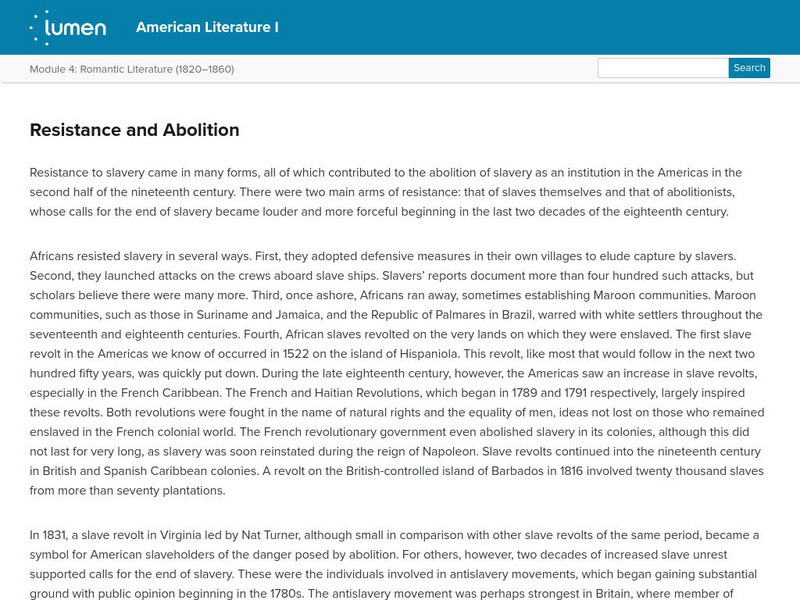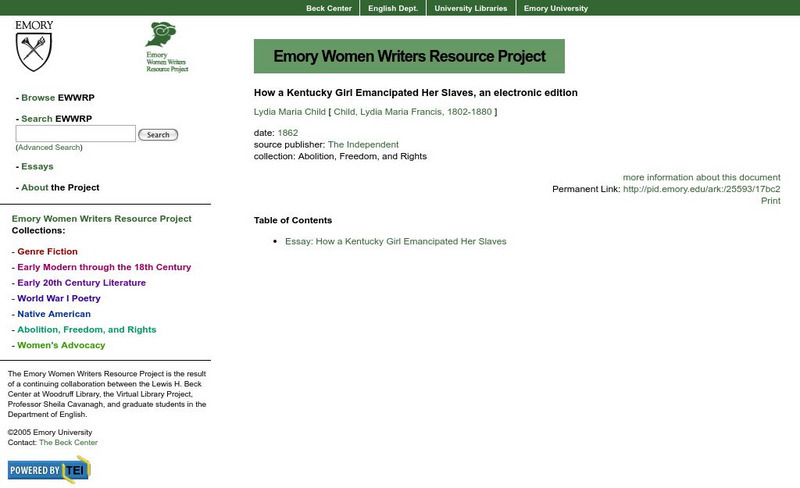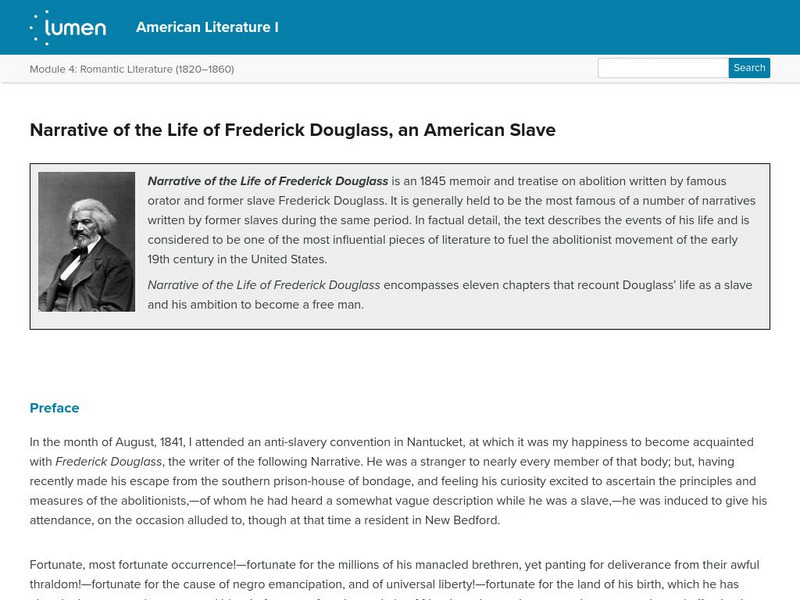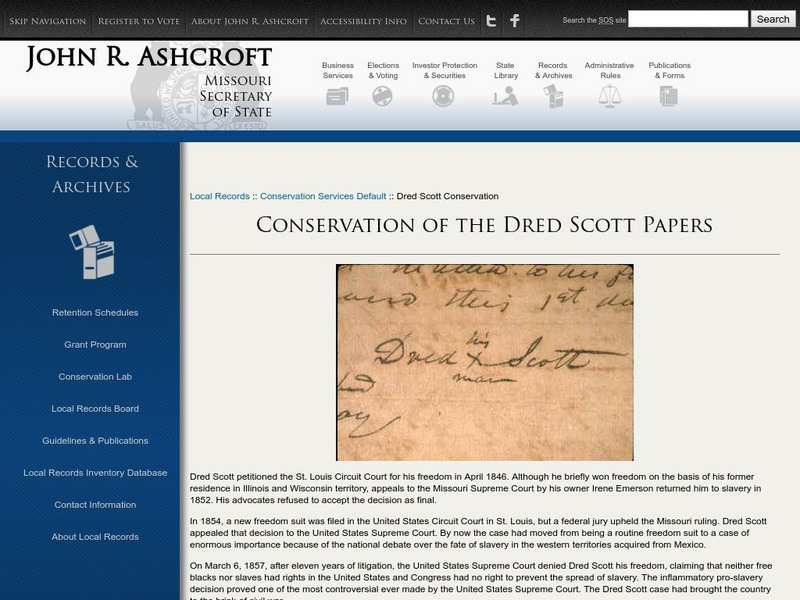Choices Program, Brown University
Choices: A Forgotten History: The Slave Trade and Slavery in New England
Unit explores, through a series of videos from notable scholars, the effects of the trade in slaves and of slavery itself on the new Americans of the time and helps students to understand how history, and the telling of history, affects...
Lumen Learning
Lumen: American Literature: Resistance and Abolition
This article focuses on the resistance and abolition of slavery in the United States. It discusses the ways in which the slaves resisted slavery and the role abolitionists played.
British Library
British Library: Discovering Literature: Voices in the Campaign for Abolition
From the mid 18th century, Africans and people of African descent - many of them former slaves - began to write down their stories. This article describes these writings and assesses their role in the abolition of slavery.
Other
National Maritime Museum: Freedom: Abolition in Britain
Illustrated essay on the abolition of slavery in Britain.
Understanding Slavery Initiative
Understanding Slavery Initiative: The Campaign for Abolition
Learn how the anti-slavery movement mobilized the British population to stage the campaign for the abolition of slave trade.
Emory University
Lewis H. Beck Center: Child, Lydia: How a Kentucky Girl Emancipated Her Slaves
Download the full text to Lydia Maria Child's "How a Kentucky Girl Emancipated Her Slaves." This account of a woman who freed her slaves was originally written by Lydia Child in 1862 and published in The New York Tribune.
Lumen Learning
Lumen: Narrative of the Life of Frederick Douglass, an American Slave
This is the text and audio of the autobiography Narrative of the Life of Frederick Douglass, an American Slave by Frederick Douglass. This 1845 memoir and treatise on abolition encompasses eleven chapters that recount Douglass' life as a...
BBC
Bbc: Bitesize History: Industrial Era: Triangular Slave Trade: Interpretations
Discusses the different interpretations that historians have had of the slave trade. It includes a video of Interpretations of the abolition of slavery, questions with answers, and a link to an assessment.
Independence Hall Association
U.s. History: Mount Vernon and the Dilemma of a Revolutionary Slave Holder
Read about George Washington's dependence on slaves to increase his wealth, and his private views on slavery. What were the possibilites had he expressed these views in public?
PBS
Wnet: Thirteen: The Slave Experience: Legal Rights and Government
Using primary materials and oral histories, PBS tells the story of the slaves' legal rights and their position with the US Government.
Other
The Amistad Committee: Yale, Slavery & Abolition
This essay explores Yale University's relationship to slavery. It seeks to answer questions such as why did Yale name most of its colleges after slave owners and pro-slavery leaders? Included is a downloadable PDF, timeline, map of Yale,...
C3 Teachers
C3 Teachers: u.s. History Module: Did Lincoln Really Want to Free Slaves? [Pdf]
A comprehensive learning module on Abraham Lincoln that includes three supporting questions accompanied by formative tasks and primary source materials, followed by a summative performance task. Students examine the evolution of...
Emory University
Lewis H. Beck Center: Child, Lydia Maria: Charity Bowery
Download and read Lydia Maria Child's "Charity Bowery," originally written in 1839, which tells the story of a freed slave's choices as she is allowed to take only one of her children out of slavery.
Curated OER
Etc: Slavery and Slave Trade, 1830 1850
A map of the United States during the period of 1850 to 1850 showing the effects of slavery, the slave trade, and the abolition movement on territorial development. The map uses colored patterns to indicate the areas and phases of...
Curated OER
Etc: Slavery and the Slave Trade, 1830 1850
A map of the United States during the period of 1850 to 1850 showing the effects of slavery, the slave trade, and the abolition movement on territorial development. The map uses colored patterns to indicate the areas and phases of...
Other
Douglass Archive: What to the Slave Is the 4th of July?
This site from the Douglass Archive provides the complete text with an introduction to the speech and footnotes.
Penguin Publishing
Penguin Random House: "Frederick Douglass American Slave" [Pdf]
Teacher guide for Douglass's biography features 24 pages of chapter-by-chapter study questions, quotations, and activities. Valuable post-reading activities as well as methods for eliciting student responses also included. This is a .pdf...
National Women’s History Museum
National Women's History Museum: Sojourner Truth
A former slave, Sojourner Truth was an advocate for abolition, temperance, and civil and women's rights in the 19th century.
US National Archives
Nara: The d.c. Emancipation Act
Information about, and a scanned copy of page one and five, of the D.C. Emancipation Act which freed slaves in Washington, D.C. in 1862.
Other
Missouri Secretary of State: Conservation of the Dred Scott Papers
Offers a description of the conservation of papers from the famous 1846 Supreme Court case in which a slave named Dred Scott asked the court for his freedom and was denied.
Other
Personal Site: Biography of Anthony Benezet
A short but good biography of the famous Quaker abolitionist who established a school for slaves in Philadelphia in 1770. He wrote a pamphlet in 1772 which led to the establishment of the anti-slave trade movement in England.
Khan Academy
Khan Academy: Us History: 1844 1877: Failure of Reconstruction
The abolition movement sought to end the practice of slavery in the United States.
Other
National Underground Railroad Freedom Center: Margaret Garner
Brief biographical note on the story of Margaret Garner, a fugitive slave woman who chose to kill her own daughter rather than permit her be returned to slavery.
Independence Hall Association
U.s. History: The Emancipation Proclamation
The Emancipation Proclamation in 1863 really didn't free a single slave. Read about why that was true, but also find out why Abraham Lincoln felt is was absolutely necessary to make a stand on ending slavery when he did, and how the...














